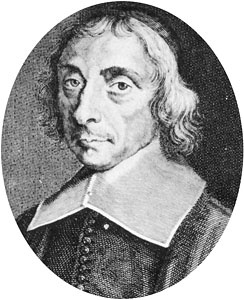Aubignac, François Hédelin, abbé d'
French dramatist and critic
born Aug. 4, 1604, Paris
died July 25, 1676, Nemours, Fr.
 associate of the statesman Cardinal de Richelieu, playwright, and critic who influenced French 17th-century writing and encouraged dramatic standards based on the classics. He wrote plays, fiction, translations of Homer and Ovid, and, most important, studies of dramatic technique and presentation.
associate of the statesman Cardinal de Richelieu, playwright, and critic who influenced French 17th-century writing and encouraged dramatic standards based on the classics. He wrote plays, fiction, translations of Homer and Ovid, and, most important, studies of dramatic technique and presentation.Although trained as an advocate, Aubignac soon turned to the Church (1628) and was named tutor to Richelieu's nephew. Encouraged by the Cardinal, he wrote several prose tragedies, three of which survive: Cyminde (published 1642), La Pucelle d'Orléans (1642; “The Maid of Orleans”), and Zénobie (1647). His polemical writings include four critical essays on the plays of Pierre Corneille and several other critical commentaries, some of which offended members of the Académie Française. When, in consequence, he was not admitted to membership, he founded his own academy in 1654; despite his political connections, however, he was unable to enlist the king's support for it, and the group disbanded not long after Aubignac's death.
His major work, La Pratique du théâtre (1657; The Whole Art of the Stage, 1684), was commissioned by Richelieu and is based on the idea that the action on stage must have credibility (vraisemblance) in the eyes of the audience. Aubignac proposed, among other things, that the whole play should take place as close as possible in time to the crisis, that audiences should not be asked to imagine changes of scene or character, and that the number of actors be restricted so there is no confusion. Despite the Pratique's small sale, it was probably a force in the formation of French Classical taste as put into practice by Corneille and Racine. Another work, Projet pour le rétablissement du théâtre français (“Plan for Reorganizing the French Theatre”), published after the Pratique, called for the establishment of a general directorship over all public theatres in order to raise comedies, in particular, from disrepute. He adamantly opposed the idea that advances in theatre were harmful to religion.
- Adobe Photoshop
- Adobe Systems Incorporated
- Ado-Ekiti
- adolescence
- Adolf
- Adolf Anderssen
- Adolf Bastian
- Adolf Butenandt
- Adolf Dygasiński
- Adolf Eichmann
- Adolf Engler
- Adolf Erik, Baron Nordenskiöld
- Adolf Erik Nordenskiöld, Baron
- Adolf Fischhof
- Adolf Franz Friedrich, Freiherr von Knigge
- Adolf Franz Friedrich Knigge, Freiherr von
- Adolf Frederick
- Adolf, Freiherr von Lützow
- Adolf Frey
- Adolf Furtwängler
- Adolf Galland
- Adolf Hitler
- Adolf Jellinek
- Adolf Loos
- Adolf Ludwig Follen